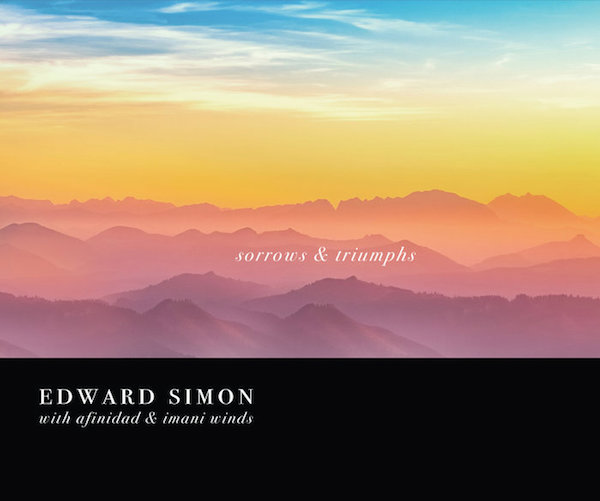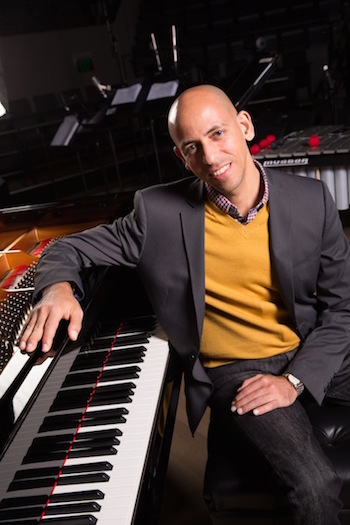Jazz CD Review: Edward Simon’s “Sorrows & Triumphs”
One doesn’t have to have gone too deeply into Buddhism to recognize its influence on the titles found here, and perhaps on the music as well.
Sorrows & Triumphs, Edward Simon with Afinidad and the Imani Winds. (Sunny side Records

By Michael Ullman
No one greeted the rhythmic complications and melodic possibilities of what was in the forties called simply “Latin jazz” more enthusiastically than did Dizzy Gillespie, who sat beside Cuban trumpeter Mario Bauza in the Cab Calloway band, who hired Cuban conga star Chano Pozo, and whose hits included the wildly exciting “Manteca,” co-written with Gil Fuller and Pozo. Yet, when Gillespie described how he composed his influential hit “A Night in Tunisia,” he said he wrote it from some chords he was working on, whose melody “had a very Latin, even oriental feeling, the rhythm came out of the bebop style.” He saw bebop and “Latin” as inevitably intertwined. Others agreed.
After waves of music from South America, including bossa nova, that shared sense of the syncretic imagination of the first generation of boppers has faded. We’ve been educated since the days of Gillespie. I once went to a talk in which Panamanian pianist Danilo Pérez distinguished amongst African-American, Cuban, and Puerto Rican music — demonstrated via the way each group talked and walked. It was funny, but it also made a compelling point. Pianist Edward Simon’s recording previous to Sorrows & Triumphs was Latin American Songbook: it began with a tango by Argentinian composer Astor Piazzolla, included “Volver” by ’30s star Carlos Gardel, and ended with Jobim’s bossa nova “Chega de Saudade.” As its title suggests, Sorrows & Triumphs focuses on Simon’s compositions and, perhaps, on his personal challenges. He has brought together an impressive assemblage of musicians: Simon’s all-star quartet of David Binney, Scott Colley, and Brian Blade is (sometimes) augmented by guitarist Adam Rogers, vocalist Gretchen Parlato, a brace of percussionists, and a wind quintet.

Edward Simon at SFJAZZ Center Photo: New Music USA.
Simon is no newcomer. Many of us were introduced to the Venezuela-born pianist when he served as a sideman for musicians as distinguished as Greg Osby (for example, the latter’s 1988 Mindgames) and as a partner with alto saxophonist David Binney (among others, on 2004’s Océanos). Regarding his musical/thematic approach when he is the leader: one doesn’t have to have gone too deeply into Buddhism to recognize its influence on the titles found here, and perhaps on the music as well. The Sorrows & Triumphs” suite moves from “Incessant Desires” to “Uninvited Thoughts (the kind you have while meditating)” and then ends up with “Equanimity.” There are some musical side trips, such as the hopeful “Venezuela Unida” before we move into “Triumphs.”
The song line-up ends with “Rebirth.” (However pleasing it might be in real life, rebirth is not the desired end for a Buddhist. Perhaps Simon’s triumphant suggests that he is still too attached to things in this world.) Musically, “Rebirth” sounds surprisingly tentative, with Gretchen Parlato’s sweetly breathy vocal moving in slow steps over Simon’s chording and bassist Colley’s lines. The quietly stated melody seems to go in a stately circle whose key is logical but unsettled. Colley’s clear-toned bass solo is a highlight of the set. Afterwards, Simon enters and the sky seems to open up when the winds join in. It’s a carefully planned emotional release.
The original “Sorrows & Triumphs” suite was commissioned by Chamber Music America’s New Jazz Works. It is well thought-out composition. The incessant energy of desires in the initial piece may be represented by way of the repeated piano line, a restless ground over which Simon has written spectacularly sprightly, boppish lines for the winds and voice. This transitions into a more settled solo by guitarist Adam Rogers over the rhythm section. “Equanimity” is evoked by the expansive sound of Blade’s cymbal and then by the restrained vocal. Simon’s “Chant” begins with a weirdly muffled and repeated note generated electronically over which Parlato sings her own lyrics. Simon’s piano is everywhere, but this session doesn’t focus on him as a soloist. What we are given instead is a brilliantly sequenced, beautifully played, and movingly composed series of pieces. The whole amounts to more than its parts, but Sorrows and Triumphs is particularly valuable for its indelible performative details.
Michael Ullman studied classical clarinet and was educated at Harvard, the University of Chicago, and the U. of Michigan, from which he received a PhD in English. The author or co-author of two books on jazz, he has written on jazz and classical music for The Atlantic Monthly, The New Republic, High Fidelity, Stereophile, The Boston Phoenix, The Boston Globe, and other venues. His articles on Dickens, Joyce, Kipling, and others have appeared in academic journals. For over 20 years, he has written a bi-monthly jazz column for Fanfare Magazine, for which he also reviews classical music. At Tufts University, he teaches mostly modernist writers in the English Department and jazz and blues history in the Music Department. He plays piano badly.))
